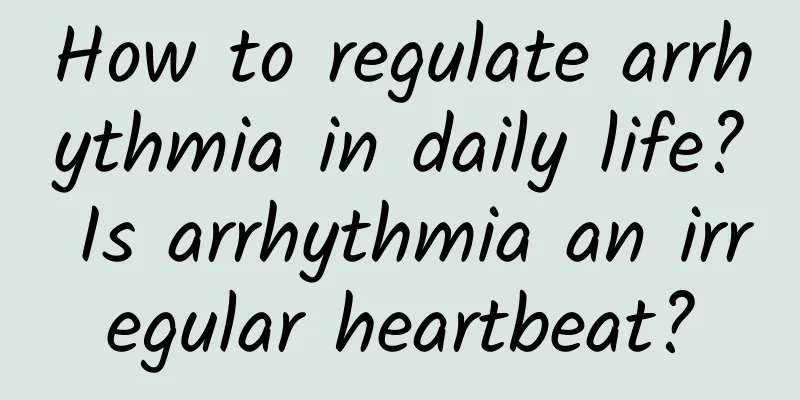How to regulate arrhythmia in daily life? Is arrhythmia an irregular heartbeat?

|
Arrhythmia is a common condition. Arrhythmia is a slow or fast heartbeat. Arrhythmia does not mean that you have heart disease, but it means that you should at least pay attention to heart problems. It can be controlled with daily attention. How to regulate arrhythmia in daily life1. Maintain a positive and stable mental state, avoid emotional out-of-control and extreme ups and downs. 2. Eat light food, eat small and frequent meals while ensuring nutrition. Do not drink strong tea, coffee or other drinks that may stimulate the heart. 3. Do not live in places with complex environments and loud environmental noise, such as near squares, train or airplane lines. 4. Live a regular life and ensure adequate sleep and rest time. 5. Choose appropriate soothing sports according to your own situation, such as Tai Chi, yoga, slow walking, etc. 6. Drastic changes in temperature and humidity can easily induce arrhythmias, so you should pay attention to prevention in advance and take measures such as keeping warm, cooling down, and dehumidifying. Is arrhythmia an irregular heartbeat?Arrhythmia refers to a cardiac rhythm disorder caused by abnormal origin and conduction of cardiac impulses, which can manifest as tachycardia, bradycardia, irregular heartbeat or cardiac arrest. Among them, ventricular arrest or fibrillation is the main manifestation of cardiac arrest and an important cause of sudden cardiac death. For example, sick sinus syndrome, premature atrial contractions (PPA), atrial flutter (AF), atrial fibrillation (AF), atrioventricular junctional premature contractions, premature ventricular contractions (PPV), ventricular flutter (VF), ventricular fibrillation (VF), etc., can mostly manifest as arrhythmia. However, most of the heart rhythms, such as sinus tachycardia, sinus bradycardia, atrial tachycardia, non-paroxysmal atrioventricular junctional tachycardia, atrioventricular nodal reentrant tachycardia, and typical ventricular tachycardia, can be manifested as regular heart rhythm. However, in clinical practice, the heart rhythm manifestations of different patients are often atypical and may vary in various ways. Therefore, the above classification is not an absolute basis and must be based on specific manifestations. Since arrhythmias can be caused by a variety of factors, including physiological factors such as tension, anxiety, and tea drinking, abnormal cardiac structure and function caused by organic heart disease, non-cardiac factors such as chronic obstructive pulmonary disease, hyperthyroidism, electrolyte disorders, and genetic factors, it is recommended that people with palpitations seek medical attention as soon as possible to check whether there is any disease. What causes arrhythmia?The causes of arrhythmia include: physiological reasons, organic heart diseases, systemic diseases, some are caused by drugs, and some are congenital. Physiological ones include: emotional excitement, drinking coffee, strong tea, drinking alcohol, smoking, etc. Organic heart diseases such as hypertensive heart disease, cor pulmonale, coronary heart disease, cardiomyopathy, valvular heart disease, pericarditis, etc. Systemic diseases such as: hyperthyroidism, anemia, metabolic acid-base disorder, hypokalemia, hypercalcemia, etc.! Drugs such as: digoxin, diltiazem, bisoprolol, epinephrine, amiodarone, etc., these drugs can treat arrhythmias, but they may also cause arrhythmias! Congenital arrhythmias such as paroxysmal atrioventricular nodal reentrant tachycardia, paroxysmal atrioventricular reentrant tachycardia, preexcitation, congenital long QT syndrome, etc. |
<<: Is it easy to raise Cardinal Tetra? How to raise Cardinal Tetra to make it grow well
>>: How to prevent arrhythmia in daily life? Will arrhythmia lead to myocardial infarction?
Recommend
Why do pregnant women always hiccup?
Every woman who gives birth to a life is a great ...
What to do when breasts hurt while breastfeeding
Breast pain during breastfeeding is a problem enc...
Reasons for high sugar antigen 125
For women, the reproductive system is a very frag...
Is it normal to not have a period for three months after giving birth?
We all know that for women, once irregular menstr...
What to do if menstrual blood is thick and stringy
Menstruation is an important sign of women's ...
Why does my lower abdomen suddenly hurt on the right side?
In my opinion, gynecological diseases are more li...
How can I make my boyfriend love me more? What kind of girls are more popular with my boyfriend?
We all know that when a boyfriend and girlfriend ...
What does a woman's back hair indicate?
Every spring, major beauty salons begin to raise ...
The reason why girls have thick ankles
Girls are more sensitive about thick ankles becau...
Second menstrual period delayed after failed IVF
If a woman has IVF, it may also lead to unsuccess...
What to eat during ovulation period
We all know that if we want to effectively increa...
What is vaginal ulcer?
Women's private hygiene care is very importan...
8 weeks pregnant with ovulation test paper
A strong positive result on the ovulation test pa...
Research and practice on primary school students' eye habits and vision care
Research and practice on primary school students&...









